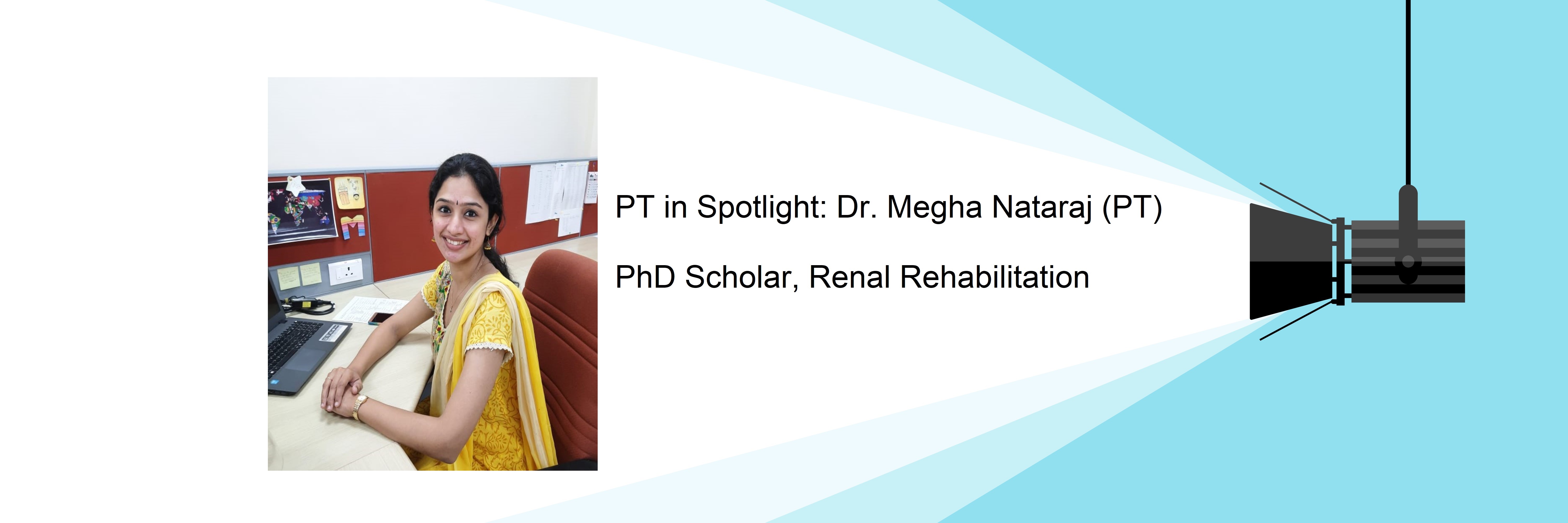This week’s spotlight features Dr. Megha Nataraj (PT). She is currently pursuing her PhD in renal rehabilitation. In this spotlight Dr. Megha talks about scope of a research as a career option for physiotherapists in India. Go ahead and read this spotlight for better insights on scope of physiotherapy research in India.

What is your name, title and workplace?
Dr. Megha Nataraj, MPT, PhD Scholar
What is your educational background?
Bachelors in Physiotherapy (BPT), MGM College of Physiotherapy, Kamothe, Navi Mumbai affiliated to Maharashtra University of Health Sciences (MUHS) Graduation year, 2017
Masters in Physiotherapy (MPT), Specialized in Cardiopulmonary Sciences, Department of Physiotherapy, Manipal College of Health Professions, Manipal Academy of Higher Education, Manipal, Graduation year, 2019
Currently pursuing 2nd year PhD in the field of renal rehabilitation at Department of Physiotherapy, Centre for Diabetic Foot Care & Research, Manipal College of Health Professions, Manipal Academy of Higher Education, Manipal, University) ( From September 2020 to Present)
What did you do soon after your Bachelors?
Through merit, I was able to complete my internship at Seth GS Medical & KEM Hospital as an intern. I later began working at SAI KRIPA Physiotherapy Clinic in Sion, Mumbai. I was in charge of diagnosing and creating management protocols for patients with diverse musculoskeletal and neurological disorders. Every day, we’d get about 80-90 patients.
This opportunity provided me with the essential hands-on experience. I felt secure in my ability to manage patients in these areas. As a result, rather than spending two years pursuing a master’s degree in either of those fields, I selected cardio respiratory physiotherapy.
What did you do soon after your Masters?
Right after finishing my master’s degree, I had the opportunity to start working as a Research Associate for an industry-funded research. It was with the Department of Physiotherapy, Center For Diabetic Foot Care & Research at Manipal. I spent a year in this position, which allowed me to expand my knowledge and skills in the areas of research and writing.
Why did you start working as a Physiotherapy Research Associate?
Since my undergraduate years, research has piqued my curiosity. However, I believe that research is devalued. As students, we are unaware of the importance of producing high-quality work.
When students pursue a post-graduate degree, they are expected to work independently as investigators on a thesis or research project. This can be challenging, especially if we have no prior experience with research.
For me, my teachers at Manipal were always helpful. They piqued my interest in research. It eventually led to the publication of my master’s thesis in a Scopus-Indexed internationally peer-reviewed journal (https://doi.org/10.1016/j.jtumed.2021.11.011).
After finishing my master’s degree, I got an opportunity of becoming a research associate at my institution. I chose to take it on since it would allow me to do additional research.
What did you do at your job as a Physiotherapy Research Associate?
My work was in the field of a medical product designed for treatment of a specific population. I understood about where academia and industry collide at a point and how research has a lot of potential even as physiotherapists. I can’t say much about the project I worked on because it’s confidential.
How can a physiotherapist enter the field of research?
As physiotherapists, we must be aware that research can be pursued in a variety of methods. Several universities have positions available, including research associate, research assistant, and junior research fellow. They can hire anyone from an experienced researcher to a fresher, depending on the job.
I would urge anyone interested in pursuing a career in research to keep an eye on the websites of all the universities. These universities can be followed on social media sites like LinkedIn. Usually, open positions are posted there.
You can take a general entrance exam. The UGC NET exam is one of the tests I’m familiar with. This test can be given by anyone with a master’s degree. Candidates can learn more about this exam by visiting the NTA website. Some private universities will hold their own entrance examination. The relevant university’s website will include all of the necessary information.
Working with physio-based firms that develop goods is another option in the realm of research. For example, a company aiming to design sport-specific footwear might be looking for someone with a background in biomechanics and sports. These businesses provide excellent exposure to industry-oriented research.
How did you get enrolled in the PhD physiotherapy program?
In my situation, I took the Manipal Academy of Higher Education’s Online Eligibility Entrance Test for PhD admissions. It is a two-part MCQ-based test (Part 1 focuses on physiotherapy core subject, while Part 2 focuses on logic, reasoning, aptitude, arithmetic, and other related topics).
The exam was followed by an interview round for selection. It’s vital to note that people from various walks of life, from freshmen to seasoned professionals, take these exams. The exam is difficult to pass and requires the applicant to put out significant effort.
I got chosen for the interview round after passing the admission exam. You should know why you want to pursue a PhD at this time. Your willingness to commit to a long-term programme is also tested during the interview. They might inquire about your future intentions and how they might impact your PhD programme.
I’d also like to point out that when obtaining a PhD, you should think about your financial situation. You will receive a monthly scholarship while earning your PhD. This amount is frequently less than what you could earn if you started working. So, if you’re pursuing a PhD, be prepared for a loss in salary.
Tell us more about your program
I am pursuing a PhD in the field of renal rehabilitation. I’ve been interested in learning more about renal health since finishing my master’s degree. We don’t have a lot of information on renal rehabilitation. I considered working with people who were suffering from the first stage of renal illness, diabetic kidney disease.
What is your typical day of work?
My day begins at 8:30 a.m. & ends at 5:00 pm. I work in the hospital outpatient department most days of the week. This is where we treat patients and conduct microteaching for physiotherapy students. In the second portion of my day I work on my academic and PhD duties like reading articles, writing articles, attending conferences/workshops etc.
What do you like about your work?
Everything about my job makes me happy. I am involved in patient care, which I find really rewarding. Because of my intimate ties to the patient population, I am able to comprehend real-life issues and work on potential solutions through my research.
What are the challenges you face as a PhD scholar?
Some days are difficult because you must multitask between things. Each activity is important and must be prioritized.
What are the courses, workshops, books that helped you in your career?
I spend my free time reading books and viewing instructional videos on sites like YouTube, Udemy, Coursera and LinkedIn. All of these resources have helped me.
What type of person would do well as a PhD scholar and what type of person wouldn’t?
Everyone, in my opinion, has the ability to obtain a PhD degree. It is not necessary to be academically clever or have a high IQ. You can certainly succeed in your PhD if you are willing to self-learn, be proactive, and disciplined enough to stick to your plans and goals. Furthermore, being coachable and willing to learn from one’s own mistakes are both excellent ingredients.
What is next for you?
I am absolutely devoted to obtaining my PhD.
Aside from that, I’ve started a new academic enterprise called “Physio Quotient” (website: physioquotient.org), which is a one-of-a-kind academic platform for the physiotherapy community. The goal of this enterprise is to provide workshops and webinars to teach people about research, writing, and publishing. It also provides career coaching to students who desire to advance their careers.
What is the advice you would like to give to someone who wants to pursue a PhD?
Now is the time to do it! So, Stop Worrying and Start Doing!
Where can people reach you?
I am happy to connect with anyone who needs my assistance. You can reach me directly through LinkedIn.
You can also read and follow my blog posts https://medium.com/@drmeghanataraj
Hello, My name is Tejashree Limaye. I am a physiotherapist with 10+ years of experience. I help you go from being stuck in your career to finding a job you love! I provide career guidance about clinical and non clinical PT career in India. I also help you with US PT licensing process. Welcome to my blog, I hope you find the exact guidance you have been looking for!
